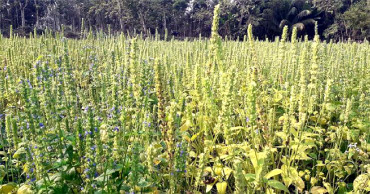Crops
Flashfloods damage crops worth Tk 127 crore in Kurigram
Crops on around 8,027 hectares of land have been damaged due to the recent floods in Kurigram district.
Crops worth Tk 127 crore have been damaged, according to the Department of Agricultural Extension (DAE) .
According to Kurigram DAE, in nine upazilas of the district, 80,000 farmers have been affected by the recent floods.
Mofizal Haque, a farmer Sadar upazila, said the seedbeds that he prepared have been washed away.
“I am preparing new seedbeds again. I have no way to recoup these losses,” he said.
The damaged crops in the district include Aman seedbed, jute, Aush paddy, sesame, vegetables, peanuts, banana, corn, chili, ginger, turmeric and lentil.
Read: Satkhira flood washes away Tk8.28 crore worth of fish, crab, shrimp
Around 312 hectares of Aman seedbed, 2,500 hectares of Aush, 3,800 hectares of jute, 114 hectares of sesame, 1,600 hectares of vegetables and 18 hectares of quinoa have been damaged in floodwaters.
The Agriculture Ministry has provided Aman seeds and fertilizers to 7,000 farmers in the district.
Nikhil Chandra, another farmer of the area, said, “No matter how hard it is, we have to plant paddy again with a loan.”
Kurigram DAE Deputy Director (Acting) Md Samsuddin Mia said they have provided seedlings and fertilizers to the farmers and some have already planted seedlings in the field.
3 years ago
State minister talks tough after Sunamganj flash floods damage crops on 5,000 hectares of land
The government has ordered an investigation into the recent flash floods caused by breached protection embankments in Sunamganj, said State Minister for Water Resources Zahid Faruk on Monday, warning action for negligence.
Already a six-member committee, headed by an additional secretary, has been formed to investigate the allegation, he said adding, it will submit the report within ten days.
Talking to reporters at the Secretariat he blamed early rainfall in the first week of this month for the sudden floods.
The recent flash floods in Sunamganj district damaged crops on nearly 5,000 hectares of land, said State Minister for Water Resources Zahid Faruk on Monday.
From April 1 to April 6 the local met office recorded 1209 mm rainfall, he said.
Also read: Thakurgaon farmers fear crops loss after hailstorm
The government, he said, has taken preparation to help farmers cope with the floods, he said.
Asked about alleged delays in repairing the breached dams Faruk said the work could not be completed due to stagnant water.
“We started repair work in December and finished it in February. Up to 90% work has been done,” he said.
The state minister said the government has taken projects worth Tk 494 crore. Another project of river dredging worth Tk 1547 crore is underway in the district.
“If the projects are approved by the Executive Committee of National Economic Council (ECNEC) then we can start work in November. We have identified the problems and we hope there will be no problem next year,” he said.
The leave of staff and employees of the ministry has been cancelled, he added.
Also read: Flash floods damage crops worth Tk 100 crore in Sunamganj haors
Besides, the government is thinking of waiving the loan of affected farmers in the district, he said.
In 2017, the government suspended eight engineers, who were found negligent of duty, he said.
The Anti-Corruption Commission will take action following rules against the eight suspended engineers, he added.
Talking about the irregularities brought against the Water Development Board, the minister said “We will try our best to bring it to a tolerable level.”
AKM Enamul Haque Shamim, deputy water resources minister, who was present at the press briefing, said action will be taken against those found involved in corruption in haor areas.
“During a recent visit to Sunamganj, I have seen that breaches occurred in three places of 535-km embankments We managed to repair one spot but in another spot the depth of water is 50-60 meter while the repair work of another spot is going on,” said Shamim.
Flash floods triggered by onrush of water from the upstream inundated Boro crops on 5,000 hectares of land in 14 haors in Sunamganj, causing loss of Tk 100 crore, according to local agriculture office.
According to local DAE office, Boro paddy has been cultivated on 2.22 lakh hectares of land in the district this year and the production target has been set at 13.50 lakh MTs.
3 years ago
Untimely rain damages crops in Faridpur
Incessant showers over the past few days have damaged crops across 20,000 hectares of farmland in Faridpur district, officials said on Tuesday.
Deputy director of Faridpur Agricultural Extension Department Hazrat Ali said, "20,000 hectares of crop land have gone under water. But we will give incentives to the affected farmers to overcome their losses. Our officials will survey the affected areas soon."
Read: Incessant showers damage lentil, wheat & mustard crops in Narail
Crops such as onions, garlic, potatoes and mustard have also sustained damage in the showers, according to farmers. "Untimely rain has taken away our last hope. We don't know how to tide over the losses," a farmer told UNB.
Atul Sarker, district commissioner of Faridpur, said, "We have already asked the authorities concerned to ascertain the extent of damage. The government stands by the farmers."
4 years ago
Incessant showers damage lentil, wheat & mustard crops in Narail
Incessant showers over the past three-four days have caused widespread damage to lentil, chilli, mustard and wheat crops across 18,632 hectares of farmland in Narail district, authorities said.
"The untimely rain will delay the cultivation of Rabi crops this year in the district, which starts from mid-November and lasts till March," Dipak Kumar Roy, deputy director of Narail Agricultural Extension Department, told UNB.
Also read: Faridpur flood: Over 2000ha cropland submerged for nearly four weeks
The showers have damaged winter crops like radish, cabbage, cauliflower and turnip across 1,045 hectares, mustard crops across 7,730 hectares, lentil crops across 7,545 hectares and wheat crops across 2,100 hectares, according to data.
Besides, boro seed beds across 162 hectares of farmland have also sustained damage in the rain, the Agricultural Extension Department said.
"Wheat, mustard, and lentil crops have sustained the maximum damage in the rain as these are planted across 70 percent of farmland in Narail," said Dipak. "However, the extent of damage could be ascertained only when the showers stop."
Also read: 15,520 hectares of croplands inundated in Kurigram
Tazul Islam, agricultural representative of Narail-2 MP, however, said that the district may lag in crop production this season.
4 years ago
Nor’wester kills one, damages houses, crops in Shariatpur
A sexagenarian man was killed as a nor’wester lashed different upazilas of the district on Thursday.
In Naria upazila, a man identified as Jahur Akon, 60, a boatman of Jakir Kha Kandi village in the upazila, was killed as a branch of a tree fell on him, said Hafizur Rahman, officer-in-charge of Naria Police Station.
The storm started around 5 :30 pm and swept over different parts of the district including Naria, Bhederganj, Jajira upazilas of the district.
Besides, a number of houses were damaged and many trees were uprooted during the storm.
Additional deputy commissioner of the district Mohammad Mamun-Ul-Hasan said steps will be taken to provide relief to the affected people.
5 years ago
‘Chia’ cultivation gives hope to Jashore farmer
At a time when losses are forcing many farmers to turn to cash crops, a farmer has found hope in Chia cultivation in Manirampur upazila of Jashore – with a little help from his agriculturist brother.
Highly nutritious Chia seed shares similarities with sesame seed and the farming system is quite identical. It is mainly cultivated in Canada, Australia, Japan, America, Chili, Mexico, and New Zeeland, among other developed countries.
Hafizur Rahman, a local farmer, cultivated Chia on 50 decimals of land this season under the direct supervision of his elder brother agriculturalist Dr Md Mashiur Rahman, a professor at the Bangladesh Agricultural University.
Dr Rahman collected seed from Canada in 2016 and later led an experimental cultivation.
He told UNB that he became interested in Chia farming in Bangladesh after learning about its nutritional quality, and examined local soil and climate to see if it is suitable for Chia cultivation.
“After months of research, I started experimental Chia cultivation and succeeded in 2017,” he said, adding that he encouraged his brother to start cultivating Chia.
Chia plants look like sesame but its nutritional quality is higher than many crops and it is very expensive.
Hafizur said Chia seed can be sown in the Bengali month of Karthik and Agrahayan. “I’ll harvest the crop within a few days,” he said.
Only 200 grams of seed are enough for each Bigha, he said, adding that Chia plant requires one or two irrigations and requires less insecticide due to less pest attack rate.
Farmers should use a little amount of Urea, TSP and MOP fertilisers 15-20 days before sowing Chia seed in the field, he added.
Each kilogram of Chia seed costs about Tk 2,700 in Dhaka’s market.
It turns into jelly when the seeds are put in water. This jelly can be eaten with bread, pudding, cake and loaf.
Hirok Kumar Sarkar, the Upazila Agriculture Officer, said they will encourage local farmers to cultivate Chia in the next season.
6 years ago




.jpg)


